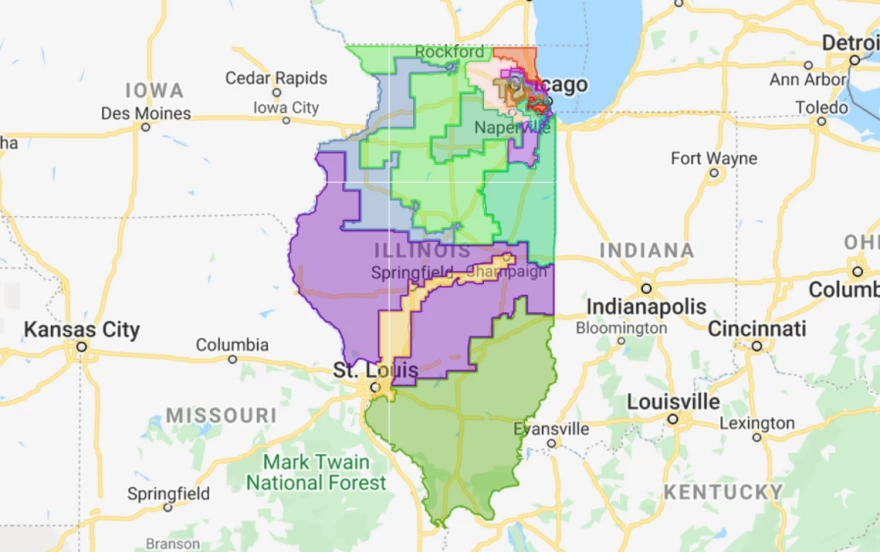Gov. JB Pritzker is leaving the door open to changing Illinois’ congressional maps to “counterbalance” an attempt by Texas politicians to add more Republican seats to the U.S. House.
The Texas legislature is meeting in special session this week with 18 items on their agenda, including redrawing the state’s congressional maps after President Donald Trump urged the state to redraw district boundaries ahead of the 2026 midterm election in hopes of adding five more Republicans to Texas’ congressional delegation and insulating his party against any seats they might lose elsewhere in the country.
Pritzker blasted the move at an unrelated event in Chicago on Tuesday.
“I think we ought to play by the rules – everybody – and I think we ought to have an election in 2026,” Pritzker told reporters. “We’ll see who comes out ahead in the Congress. But I think cheating the way the president wants to is improper.”
Redrawing legislative maps typically happens once a decade after the national census, though sometimes states have been ordered by courts if their legislative maps violated voting rights laws. Texas Republicans also redrew the state’s congressional maps in the mid-2000s to add more Republican-leaning districts.
Pritzker didn’t rule out the thought of Illinois Democrats redrawing congressional districts to add more Democrat-leaning districts in response to Texas.
“We’re all going to have to band together to try to address that; at least to try to stop them by letting them know that if we were doing what they were doing, in fact we would counterbalance and indeed take control of the Congress,” Pritzker said.
The process, however, would have to go through Illinois’ legislature.
“That’s not something we’re pursuing,” a spokesperson for Senate President Don Harmon, D-Oak Park, said.
Illinois Republicans blast comments
Pritzker’s comments accusing Texas Republicans of “cheating” left Illinois Republicans furious. The party pushed through maps in 2021 with only Democratic support in a largely opaque remap process.
Illinois’ map divides the state’s 17-member congressional delegation into 14 Democrat-leaning districts and three Republican-leaning districts. The three districts currently held by Republicans are mostly large, meandering rural areas Democrats didn’t draw into districts they wanted.
“It's rich that the Governor now claims to support playing by the rules — after he enthusiastically signed into law the most gerrymandered maps in the nation,” House Republican Leader Tony McCombie, R-Savanna, said in a statement. “When it was convenient, he promised to reject partisan maps in favor of fair representation.”
Rep. Ryan Spain, R-Peoria, also condemned gerrymander in other states.
“I disagree with efforts in other states to double down on further partisan gerrymandering, but I can make that statement because I voted against partisan gerrymandering in Illinois and have been dedicated to its elimination for many years,” Spain said in a statement.
Illinois’ current congressional map earned an F grade from the independent Princeton Gerrymandering Project, finding the map fails in every category on political fairness and competition and geographic compactness.

The 16th District represented by Rep. Darin LaHood runs from south of Bloomington to Galena and includes areas outside urban populations in Bloomington-Normal, Peoria and Rockford. The 15th District represented by Rep. Mary Miller includes much of central Illinois but is split in half by a Democrat-leaning district that runs right through the middle of it to include Champaign, Decatur, Springfield and the St. Louis suburbs.
The 12th District represented by Rep. Mike Bost includes a large swath of southern Illinois.
Whether Illinois Democrats could expand the map to create 15 Democrat-leaning districts remains to be seen, as even maps drawn for partisan gain must meet legal requirements, including for compactness, as outlined in state and federal voting rights laws.
The map was signed in 2021 by Pritzker after the House Democrats’ lead mapmaker, Rep. Lisa Hernandez, D-Cicero, admitted during debate over the maps that “partisan advantage” was considered.
Candidate Pritzker’s position
As a candidate for governor in 2018, Pritzker said he opposed gerrymandered maps and supported an independent mapmaking commission.
“I 100% oppose gerrymandering,” Pritzker said in a 2018 social media post two months before he would go on to win the Democratic nomination for governor. “Legislative districts should adhere to both the Federal and Illinois Voting Rights Acts, and I support redistricting reform that advances fairness and removes politics from the process.”
Republicans have filed legislation to create an independent redistricting commission and take the power away from lawmakers, but it has never been considered by the General Assembly under Democrat control.
Republicans have filed multiple lawsuits to try to force an independent commission to redraw the maps, but they have failed early in the court process.
Capitol News Illinois is a nonprofit, nonpartisan news service that distributes state government coverage to hundreds of news outlets statewide. It is funded primarily by the Illinois Press Foundation and the Robert R. McCormick Foundation.
This article first appeared on Capitol News Illinois and is republished here under a Creative Commons Attribution-NoDerivatives 4.0 International License.

